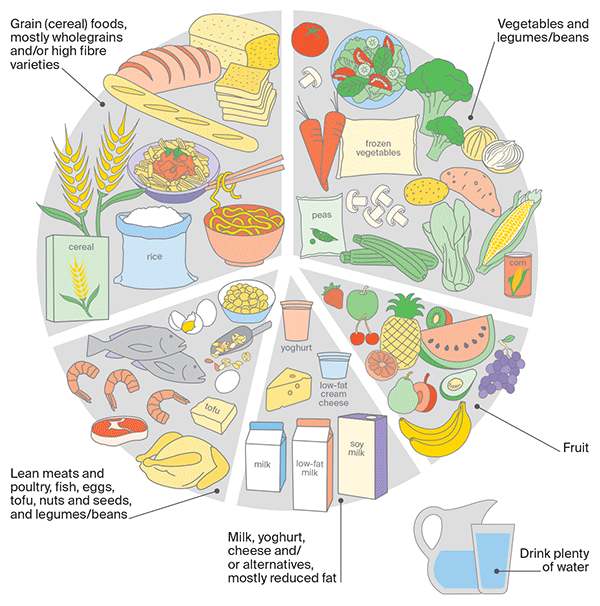In a world filled with conflicting nutrition information, getting advice from a qualified dietitian can make all the difference in your health journey.
Dietitians provide evidence-based guidance tailored to your specific needs, helping you navigate the complex landscape of nutrition.
This comprehensive guide explores essential healthy eating principles, explains the crucial role dietitians play in healthcare, and offers practical advice for implementing sustainable dietary changes.
Related article: Eating Disorder Treatment in Singapore: Causes, Recovery
Understanding the Foundations of Healthy Eating

The foundation of good health begins with understanding what constitutes a balanced diet. While individual nutritional needs vary, certain core principles apply universally.
These principles form the backbone of evidence-based dietitian advice that can help optimize your health and wellbeing.
Energy Balance: The Core Principle
The key to maintaining a healthy weight lies in balancing energy intake with energy expenditure. As the document states, “If you eat or drink more than your body needs, you’ll put on weight because the energy you do not use is stored as fat.
If you eat and drink too little, you’ll lose weight.”
For reference, the general recommendations are that men need approximately 2,500 calories a day (10,500 kilojoules), while women need approximately 2,000 calories a day (8,400 kilojoules).
However, these are just averages. Your specific caloric needs depend on various factors including age, activity level, current weight, and health goals.
You might like: The Ultimate Guide to Losing Weight in Singapore
The Eight Pillars of Healthy Eating
1. Prioritize Higher Fiber Starchy Carbohydrates
Starchy carbohydrates should comprise approximately one-third of your diet. Opt for higher fiber or wholegrain varieties such as wholewheat pasta, brown rice, potatoes with skins, whole grain bread, and oats.
These foods contain more fiber than refined carbohydrates, helping you feel fuller longer. Contrary to popular belief, starchy foods aren’t inherently fattening—gram for gram, they provide less than half the calories of fat.
The calorie content increases primarily from added fats during preparation (oil, butter, creamy sauces).
This might help: Health Screening in Singapore
2. Consume Abundant Fruits and Vegetables
Aim for at least 5 portions of varied fruits and vegetables daily. These can be fresh, frozen, canned, dried, or juiced. A standard portion is about 80g for fresh, canned, or frozen produce, and 30g for dried fruits.
For fruit juices and smoothies, limit consumption to one 150ml glass daily, as these contain free sugars that can damage teeth.
Simple ways to increase your intake include adding banana slices to breakfast cereal, swapping mid-morning snacks for fresh fruit, and incorporating vegetables into sandwiches and main dishes.
Related article: Acid Reflux and GERD in Singapore: Causes, Symptoms, and Treatments
3. Include Regular Fish Consumption
Fish provides excellent protein and essential vitamins and minerals. Try to eat at least two portions weekly, including at least one portion of oily fish, which contains beneficial omega-3 fatty acids that may help prevent heart disease.
Oily fish options include salmon, trout, herring, sardines, and mackerel. Non-oily fish options include haddock, cod, tuna, and plaice.
While canned and frozen fish are convenient options, be mindful that smoked and canned varieties may contain high sodium levels.
This might help: Diabetes Treatment in Singapore: Types, Risks
4. Monitor Fat and Sugar Intake
While some fat is essential in your diet, the type and amount matter significantly:
Saturated vs. Unsaturated Fat: Daily saturated fat recommendations:
- Men: no more than 30g
- Women: no more than 20g
Common sources of saturated fat include fatty meat cuts, butter and lard, hard cheese, cream, and processed pastries and biscuits.
Instead, favor unsaturated fats found in vegetable oils and spreads, oily fish, avocados, and nuts and seeds.
Sugar Awareness: Excessive sugar consumption increases obesity and tooth decay risks. The focus should be on reducing free sugars—those added to foods or found naturally in honey, syrups, and unsweetened fruit juices.
Food labels can help identify sugar content:
- High sugar: more than 22.5g of total sugars per 100g
- Low sugar: 5g of total sugars or less per 100g
This might help: TCM for Irregular Menstruation
5. Limit Salt Consumption
High salt intake can elevate blood pressure, increasing heart disease and stroke risks. Adults should consume no more than 6g of salt (about one teaspoon) daily, with lower recommendations for children.
Approximately 75% of salt in our diet comes from processed foods like breakfast cereals, soups, breads, and sauces.
Reading food labels can help identify high-sodium products (more than 1.5g of salt per 100g).
6. Maintain Physical Activity and Healthy Weight
Regular physical activity works in tandem with healthy eating to reduce serious health condition risks. For adults, this means:
- At least 150 minutes of moderate-intensity activity weekly
- Strength exercises on two or more days weekly
Being overweight increases risks for conditions like type 2 diabetes, heart disease, and certain cancers.
Most adults seeking weight management benefit from consuming fewer calories while increasing physical activity.
Related article: TCM Pain Management in Singapore: A Holistic Approach to Chronic Pain Relief
7. Stay Well-Hydrated
Proper hydration is crucial for all bodily functions. The general recommendation is 6-8 glasses of fluid daily, in addition to what you obtain from food.
Healthier beverage choices include water, lower-fat milk, sugar-free drinks, and tea and coffee (without added sugar).
Limit sugary soft drinks and even unsweetened fruit juices, as these contain free sugars that can damage teeth and add unnecessary calories.
8. Don’t Skip Breakfast
A common misconception is that skipping breakfast aids weight loss. However, a nutritious breakfast high in fiber and low in fat, sugar, and salt provides essential nutrients and energy to start your day.
A wholesome breakfast might include wholegrain cereal with semi-skimmed milk, fresh fruit, and whole grain toast with a small amount of spread.
You might be interested: TCM for Sinusitis and Allergic Rhinitis Treatment in Singapore
Understanding the Dietitian Profession
What Sets Registered Dietitians Apart
A registered dietitian (RD) or registered dietitian nutritionist (RDN) is a healthcare professional with specialized training in nutrition science.
Unlike general “nutritionists,” dietitians must meet rigorous educational and professional standards.
Qualifications and Credentials
To become a registered dietitian in most countries, one must:
- Complete at least a master’s degree from an accredited nutrition and dietetics program
- Fulfill extensive supervised practice requirements (typically 1,000+ hours)
- Pass a national certification examination
- Maintain credentials through continuing education (usually 75+ hours every five years)
This rigorous preparation ensures dietitians can safely provide evidence-based nutritional advice for both prevention and treatment of medical conditions.
Professional Settings
Registered dietitians work across various healthcare and community settings including hospitals and medical clinics, community and public health organizations, food service operations, research institutions, private practice, corporate wellness programs, and schools and universities.
The Difference Between Dietitians and Nutritionists
While these terms are sometimes used interchangeably, important distinctions exist:
| Aspect | Registered Dietitians | Nutritionists |
|---|---|---|
| Education | Minimum master’s degree from accredited program | Variable; may have nutrition-related education but no standardized requirements |
| Clinical Training | 1,000+ hours supervised practice | Not required |
| Certification | Must pass national examination | Optional certifications available |
| Regulation | Legally protected title; often requires state licensure | Generally unregulated; anyone can call themselves a nutritionist |
| Scope of Practice | Can provide medical nutrition therapy and counseling | Usually limited to general nutrition information |
| Insurance Coverage | Services often covered by health insurance | Services rarely covered by insurance |
As the document notes: “All registered dietitians can also be considered nutritionists, but all nutritionists may not necessarily be registered dietitians.”
When to Consult a Dietitian
Dietitians provide personalized nutritional care for numerous conditions and life stages. Consider working with a registered dietitian if you:
Consider working with a registered dietitian if you have medical conditions such as diabetes, heart disease, digestive disorders, are undergoing cancer treatment, have food allergies or intolerances, or need help managing kidney disease.
Weight Management

A dietitian can provide sustainable, evidence-based approaches to weight loss or gain, help break cycles of yo-yo dieting, offer support for obesity-related health concerns, and provide guidance on balancing nutrition with hormonal conditions affecting weight.
Life Stages and Special Populations
Dietitians provide specialized nutrition support during pregnancy and breastfeeding, offer pediatric nutrition guidance for children, help navigate menopause and its nutritional implications, address changing nutritional needs of older adults, and provide performance nutrition for athletes.
General Wellness
For overall wellness, dietitians can help improve eating patterns, provide guidance on transitioning to plant-based or vegetarian diets, offer support for developing healthier relationships with food, and assist with interpreting nutrition research and evaluating fad diets.
The Dietitian Approach to Personalized Nutrition
Initial Assessment Process
When working with a dietitian, expect a comprehensive evaluation that examines:
- Medical History: Existing conditions, medications, and family health history
- Dietary Analysis: Current eating patterns, food preferences, and cultural considerations
- Lifestyle Factors: Exercise habits, sleep patterns, stress levels, and daily routine
- Personal Goals: What you hope to achieve through nutritional intervention
- Lab Results: Review of relevant bloodwork and diagnostic tests
This holistic approach allows the dietitian to understand your unique needs before developing recommendations.
Beyond Basic Meal Plans
Modern dietetic practice extends far beyond simply creating meal plans. Today’s dietitians address the psychological aspects of eating behavior, provide practical cooking and meal preparation strategies, offer grocery shopping guidance, help navigate restaurant menus and social eating situations, support sustainable behavior change through motivational counseling, collaborate with your healthcare team for integrated care, and adjust recommendations based on your progress and feedback.
Specialized Areas of Dietitian Practice
Dietitians often specialize in specific areas of nutrition, including:
Sports Nutrition
Sports nutrition dietitians help optimize fueling strategies before, during, and after workouts, develop meal timing protocols for peak performance, address specific nutrient needs for different sports and activities, create personalized hydration plans, and support recovery through targeted nutrition.
Pediatric Nutrition
Pediatric dietitians focus on supporting healthy growth and development, addressing picky eating behaviors, managing food allergies and intolerances in children, promoting positive food relationships from an early age, and providing nutritional support for children with medical conditions.
Geriatric Nutrition

Dietitians working with older adults address changing nutritional needs with aging, strategies for maintaining muscle mass, nutritional approaches to bone health, medication-nutrient interactions, and supporting independence through practical nutrition solutions.
Diabetes Management
Diabetes-focused dietitians provide carbohydrate counting education, blood glucose management strategies, insulin-nutrition coordination, and long-term dietary approaches for diabetes prevention and management.
Practical Nutrition Guidance for Everyday Health
Building Balanced Meals
A balanced meal typically includes a protein source (lean meat, fish, eggs, tofu, legumes, or dairy), complex carbohydrates (whole grains, starchy vegetables, or legumes), vegetables/fruits (aiming for half your plate to be non-starchy vegetables), and healthy fats (oils, nuts, seeds, or avocado in moderate amounts). This approach ensures adequate nutrient intake while supporting energy balance.
Mindful Eating Practices
Mindful eating focuses on the experience of eating rather than just what’s being eaten. Key principles include eating slowly and without distraction, recognizing hunger and fullness cues, acknowledging food’s sensory qualities, noticing emotional triggers for eating, and developing appreciation for food’s origins and preparation.
Research indicates mindful eating can help with weight management, improve digestion, and foster healthier relationships with food.
Practical Healthy Eating Tips
For busy lifestyles, consider batch-cooking meals when time allows, keeping nutritious snacks readily available, developing a repertoire of quick healthy recipes, utilizing healthy convenience foods strategically, and planning meals before grocery shopping.
For budget-conscious eating, focus on seasonal produce, incorporate economical protein sources like legumes and eggs, buy staples in bulk when possible, minimize food waste through proper storage and using leftovers creatively, and compare unit prices rather than package prices.
For family nutrition, involve children in meal planning and preparation, create regular family mealtimes, offer variety without pressuring picky eaters, model healthy eating behaviors, and make nutritious foods accessible and convenient.
The Role of Nutrition in Disease Prevention
Evidence consistently shows that nutrition plays a crucial role in preventing chronic diseases.
Dietitians work with clients to implement dietary patterns associated with reduced disease risk across various health conditions.
Heart Health
Heart-healthy nutrition involves emphasizing plant foods and fiber while choosing heart-healthy fats and limiting sodium intake.
Moderating alcohol consumption is important, along with including omega-3 rich foods that support cardiovascular function and overall heart health.
Cancer Prevention
Cancer prevention through nutrition focuses on maintaining a healthy weight and emphasizing plant diversity in your diet.
This approach includes limiting processed meats and excessive red meat consumption while moderating alcohol intake.
Supporting gut health through fiber and fermented foods also plays an important role in reducing cancer risk.
Diabetes Prevention
Diabetes prevention centers on achieving and maintaining a healthy weight while choosing complex carbohydrates over refined ones.
Distributing carbohydrates appropriately throughout the day is essential, as is including protein and healthy fat with meals.
Regular physical activity alongside proper nutrition creates a comprehensive approach to diabetes prevention.
Cognitive Health
Supporting cognitive health through nutrition involves incorporating antioxidant-rich foods and consuming adequate omega-3 fatty acids.
Following Mediterranean-style eating patterns has shown particular benefits, along with maintaining adequate vitamin B12 and folate intake.
Supporting the gut-brain connection through prebiotics and probiotics also contributes to cognitive wellness.
Navigating Nutrition Information
In today’s information-rich environment, distinguishing evidence-based nutrition guidance from fads and misinformation is challenging.
Dietitians help by interpreting scientific research in context and evaluating the quality of nutrition studies.
They translate complex nutritional science into practical advice, provide perspective on trending diets and supplements, and offer personalized guidance based on your specific needs.
Red Flags for Nutrition Misinformation
Be wary of nutrition claims that promise quick, dramatic results or eliminate entire food groups without medical reason.
Watch out for advice that relies on testimonials rather than research, promotes expensive supplements as essential, or uses fear-based marketing tactics.
Claims that purport to cure multiple unrelated conditions should also be viewed with skepticism.
Comprehensive FAQ Section About Dietitians and Nutrition
What’s the difference between a dietitian and a nutritionist?
The primary difference lies in education, credentials, and scope of practice. Registered dietitians (RDs or RDNs) have completed accredited degree programs, extensive supervised practice, passed a national exam, and maintain continuing education. The title “dietitian” is legally protected in most countries.
Conversely, “nutritionist” is generally not a regulated title, meaning anyone with nutrition knowledge could potentially use it, regardless of formal education.
Dietitians can provide medical nutrition therapy and work in clinical settings, while non-credentialed nutritionists typically cannot.
When should I consider seeing a dietitian?
Consider consulting a dietitian if you have a diagnosed medical condition affected by diet (such as diabetes, heart disease, or food allergies), need help with weight management, want guidance transitioning to a specific eating pattern like vegetarianism, seek support for sports nutrition and performance, experience digestive issues, or simply want evidence-based guidance on improving your overall diet quality.
Dietitians are also valuable during life transitions like pregnancy, postpartum, or aging, when nutritional needs change significantly.
How much does a consultation with a dietitian cost?
Costs vary widely depending on location, setting, and whether insurance coverage applies. Initial consultations typically range from $100-200, with follow-up sessions costing $50-150.
Many health insurance plans cover dietitian services when medically necessary and referred by a physician.
Some dietitians offer package rates or sliding scale fees. Many public health settings and hospitals provide dietitian services at reduced rates or free of charge for qualifying individuals.
What should I expect during my first appointment with a dietitian?
Your initial consultation will likely last 45-90 minutes and involve a comprehensive assessment of your medical history, current health concerns, medications, typical eating patterns, food preferences, lifestyle factors, and nutrition goals.
The dietitian will ask detailed questions about your typical day, eating environment, cooking abilities, and relationship with food.
Together, you’ll develop realistic nutrition goals and a personalized plan that fits your lifestyle.
Be prepared to discuss your medical history and bring any relevant lab work or physician recommendations.
Can a dietitian help me lose weight?
Yes, dietitians are uniquely qualified to provide evidence-based weight management support.
Unlike fad diets, dietitians focus on sustainable approaches that consider your medical history, metabolism, lifestyle, food preferences, and psychological relationship with food.
They provide personalized calorie and nutrient recommendations, practical meal planning strategies, behavior modification techniques, and ongoing accountability.
Research shows working with a dietitian leads to more sustainable weight management outcomes than self-directed approaches or commercial weight loss programs.
How are dietitians trained to help with eating disorders?
Dietitians specializing in eating disorders typically complete additional training beyond their standard dietetic education.
They understand the complex psychological, biological, and social factors involved in disordered eating and work as part of multidisciplinary teams alongside therapists and physicians.
These specialists help restore normal eating patterns, challenge food fears, provide nutrition education without triggering behaviors, monitor medical stability, and support long-term recovery.
Their approach emphasizes healing the relationship with food rather than focusing solely on weight or calories.
Can dietitians prescribe medication?
In most jurisdictions, dietitians cannot prescribe medications as this remains within the scope of practice for physicians, nurse practitioners, and other prescribing professionals.
However, dietitians work collaboratively with medical teams to coordinate nutritional care with medication management.
Some dietitians with specialized credentials may have limited prescribing authority for specific nutrition-related supplements in certain healthcare settings, but this varies by location and is not standard practice.
How many sessions with a dietitian will I need?
The number of sessions varies significantly based on your goals, medical complexity, and progress. For general nutrition guidance, 2-3 sessions may suffice.
For chronic disease management, weight loss, or disordered eating, ongoing support over several months with sessions every 2-4 weeks is often beneficial.
Many people find an initial intensive period followed by less frequent maintenance sessions works well.
Your dietitian will recommend an appropriate follow-up schedule based on your individual needs and progress toward established goals.
What’s the difference between a clinical dietitian and a sports dietitian?
Clinical dietitians primarily work in healthcare settings like hospitals and outpatient clinics, focusing on medical nutrition therapy for patients with health conditions like diabetes, kidney disease, or gastrointestinal disorders.
They may manage tube feedings, parenteral nutrition, and complex dietary modifications.
Sports dietitians specialize in performance nutrition, helping athletes optimize training, competition, and recovery through tailored nutrition strategies.
They address energy needs, nutrient timing, hydration, supplementation, body composition goals, and sports-specific fueling protocols to enhance performance and prevent injury.
How do I verify a dietitian’s credentials?
To verify a dietitian’s credentials, check for the “RD” (Registered Dietitian) or “RDN” (Registered Dietitian Nutritionist) designation after their name.
You can verify registration status through national organizations like the Commission on Dietetic Registration in the US or equivalent organizations in other countries.
Many regions also require state licensure, indicated by credentials like “LD” (Licensed Dietitian).
Ask about their specific training and experience related to your nutrition concerns, and consider requesting references or reviewing testimonials from previous clients.
Can dietitians help with food allergies and intolerances?
Yes, dietitians play a crucial role in managing food allergies and intolerances. They can help identify trigger foods through elimination diets and systematic reintroduction protocols, teach label reading skills to avoid allergens, develop nutritionally complete meal plans that exclude problematic foods, provide alternative ingredient suggestions, and ensure nutritional adequacy despite dietary restrictions.
For diagnosed conditions like celiac disease, dietitians offer comprehensive education on maintaining strict gluten-free diets while preventing cross-contamination and addressing potential nutrient deficiencies.
What’s the difference between registered dietitian nutritionists (RDNs) and certified nutrition specialists (CNSs)?
Both RDNs and CNSs are highly qualified nutrition professionals, but they follow different certification paths. RDNs complete accredited programs in dietetics, supervised practice, and pass the Commission on Dietetic Registration exam.
CNSs typically hold advanced degrees in nutrition science (master’s or doctorate), complete 1,000 supervised practice hours, and pass the Board for Certification of Nutrition Specialists exam.
Both maintain continuing education requirements. The primary difference lies in training emphasis:
RDN education typically includes more clinical and foodservice management training, while CNS programs often focus more intensively on nutritional biochemistry and research.
How do dietitians stay current with nutrition research?
Dietitians maintain current knowledge through continuing education requirements (typically 75+ hours every five years), subscription to peer-reviewed journals, membership in professional organizations, attendance at conferences and symposiums, participation in specialized practice groups, and formal continuing education courses.
Many dietitians pursue additional certifications in specialized areas or advanced degrees.
As science-based practitioners, they’re trained to critically evaluate research quality, understand study limitations, and appropriately apply emerging evidence within the context of established nutritional principles.
Can I see a dietitian virtually?
Yes, many dietitians offer telehealth services, which have become increasingly common and accepted.
Virtual nutrition counseling can be equally effective as in-person sessions for many nutrition concerns and offers advantages including greater accessibility, elimination of travel time, flexible scheduling, and the ability to demonstrate cooking skills or evaluate food choices in your own environment. Insurance coverage for virtual sessions has expanded significantly, though policies vary.
Most dietitians use secure, HIPAA-compliant platforms for telehealth visits to ensure privacy.
How do dietitians approach plant-based and vegetarian diets?
Dietitians support plant-based eating patterns with evidence-based approaches that ensure nutritional adequacy.
They assess your current eating pattern and reasons for choosing plant-based eating, then provide guidance on meeting nutrient needs, particularly for nutrients of concern like vitamin B12, iron, zinc, calcium, and omega-3 fatty acids.
They can help design balanced meals, recommend appropriate supplements when necessary, suggest protein-combining strategies, and provide practical tips for grocery shopping, dining out, and social situations.
Their approach emphasizes nutritional adequacy while respecting personal, ethical, and cultural motivations for plant-based eating.
Conclusion: Partnering with a Dietitian for Optimal Health
Working with a registered dietitian offers a personalized approach to nutrition that goes beyond general guidelines.
Whether you’re managing a medical condition, optimizing athletic performance, or simply seeking to improve your overall health, dietitians provide evidence-based, practical solutions tailored to your unique needs and circumstances.
The field of nutrition continues to evolve with emerging research, but the core principles of balanced eating remain consistent.
By partnering with a qualified nutrition professional, you gain not only expertise but also ongoing support, accountability, and adjustments as your needs change over time.
Remember that sustainable changes happen gradually. Focus on progress rather than perfection, and celebrate small improvements in your eating habits.
With professional guidance and consistent application of evidence-based nutrition principles, you can develop a healthier relationship with food and optimize your wellbeing for years to come.

